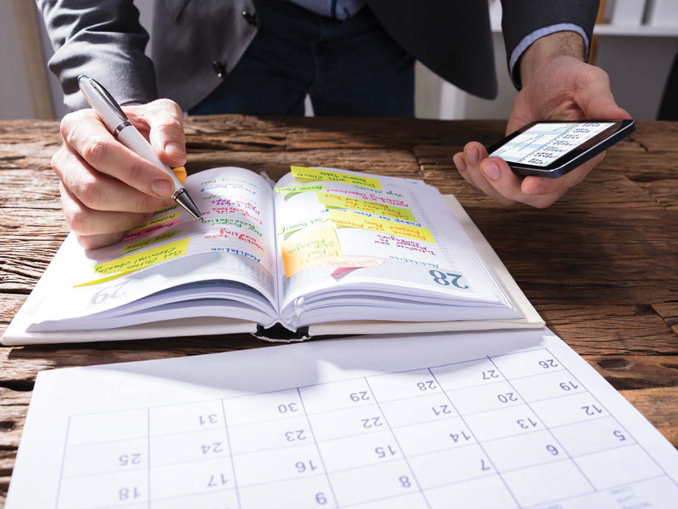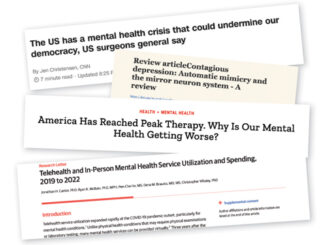 By Dr. Isabeau Iqbal, Career Coach, Isabeau Iqbal Coaching, Vancouver, British Columbia, Canada, isabeau@isabeauiqbal.com, https://www.linkedin.com/in/isabeauiqbal/
By Dr. Isabeau Iqbal, Career Coach, Isabeau Iqbal Coaching, Vancouver, British Columbia, Canada, isabeau@isabeauiqbal.com, https://www.linkedin.com/in/isabeauiqbal/
Introduction
You love to get things done—you have a daily checklist, monthly and annual goals, and drive and determination. From a productivity lens, you’re going strong.
However, if you’ve been sustaining an intense pace and heavy workload for an extended period of time, your enthusiasm and energy for the projects at hand may be waning. That’s not because you no longer care about these projects, but because you’re exhausted and maybe even burnt out.
If you were drawn to this article, you have likely experienced stress or burnout due to overwork.
Stress is a response by our body and mind to demands placed on us; we interpret and experience these demands variously, and stress may be the outcome. Stress can be positive (e.g., an upcoming holiday, a pregnancy) or negative (e.g., an unexpected project you are assigned to, conflict at work). When it is the former, it can inspire us to prioritize our tasks or meet a deadline; when it is the latter, it can cause loss of sleep, headaches, and impatience.
When stress is negative and ongoing, it can lead to burnout.
The World Health Organization’s (WHO) definition of burnout refers specifically to the occupational context and specifies that the condition results “from chronic workplace stress that has not been successfully managed” (World Health Organization, 2019). The WHO asserts that burnout is characterized by:
- feelings of energy depletion or exhaustion
- increased mental distance from one’s job, or feelings of negativism or cynicism related to one’s job
- reduced professional efficacy
Unmanageable workloads, deadline pressures, unfair treatment, or lack of support at work can all lead to burnout. If you are experiencing symptoms of stress and burnout, you know you need to rest. It’s abundantly clear—to you—and possibly even to others.
Why, then, is it so hard to rest?
This article explores our understandings of rest, the benefits of rest, and reasons that making time for rest is challenging. It ends by providing strategies for incorporating more rest into your life.
What Do We Mean by Rest?
Rest is both a process (to rest) and a condition (being in rest) (Asp, 2015). Rest is frequently associated with ceasing something, usually work. Common dictionary definitions frame rest as a period of relaxation during which one stops engaging in stressful or strenuous activities. Adjoining concepts of rest include peace and relief from problems and pain.
I like to think of rest as any behavior aimed at increasing physical or mental well-being and ascribe to the view that rest is never “doing nothing”; rather, it is doing something—something that enables regeneration (e.g., cells renew, memory consolidates). Matthew Edlund (2010) describes four kinds of active rest: mental, social, spiritual, and physical. Seen this way, rest belongs on a continuum between active or passive doing. Active rest, for example, could consist of walking, mountaineering, or gardening. Passive rest may be taking a nap or doing daydreaming.
Regardless of the exact type of rest you engage in, rest brings many benefits.
Benefits of Rest
Research has shown that rest has multiple benefits. These include:
- boosting creativity
- helping us think, process information, and innovate
- augmenting our productivity and effectiveness
- improving mood and relationships
- improving cardiovascular health and lowering blood pressure
(Asp, 2015; Edlund, 2010; Pang, 2016)
Rest is vital for strong mental health and allows our body to restore and rebuild. In other words, rest improves our overall well-being.
Five Reasons It Is Hard to Rest
Here are reasons why it can be hard to integrate rest into our lives, even when we recognize we need it.
- Our self-worth is tied up in our accomplishments.
Many of us live in a society that promotes the belief that our self-worth is correlated with our accomplishments. Consequently, the equation that predominates in our minds is “I do more + I accomplish more = I am more.” Accomplishments, in this case, are typically wrapped up in notions of prestige and success: career advancement, more education and training, a higher salary. On the other hand, being present with your family, going for a leisurely walk, doodling, etc., aren’t normally categorized as accomplishments for people who struggle to rest.When rest is framed this way—as a discontinuation or cessation of something that builds our value—it is unsurprising that those of us who are ambitious resist rest. To us, rest is distressing.
- The relationship between productivity and happiness is complex.
The relationship between happiness and productivity travels in both directions. That is, happiness leads to greater productivity at work (Oswald et al., 2015), and being productive can contribute to our well-being when it enhances our sense of purpose and brings us to a “flow state” (Laila, 2021). At a physical level, a dopamine response is released when we accomplish a task; this creates a feeling of happiness and satisfaction.However, when we are driven by productivity, we can lose track of our limits and become depleted by pushing too hard, too much. It has been claimed that we function in a productivity-obsessed society (Kohli, 2020) living in a “productivity pandemic” (Vanvuren, 2019). Trying to be productive all the time is stressful and harmful. - We think we need to earn rest.
In North American culture, there is a dominant discourse that teaches us that we need to “earn our rest.” We may know that isn’t true but still succumb to that belief.
- We don’t want to say “no.”
Sometimes making time to slow down is difficult because we have trouble saying “no” and, consequently, become overcommitted. We may take on a project or accept an invitation we would have preferred to decline to avoid disappointing or hurting someone. Or, we may push ourselves to fulfill certain obligations because we worry that not doing so would lead others to perceive us as irresponsible. We also avoid saying “no” when we fear it will put us into conflict with someone else.Our reluctance to say no is rational given that we carry out our work in a context where labor productivity is tied to economic success (Jackson & Victor, 2011) and saying “no” may lead to loss of work, disgruntled clients, and a tarnished reputation. - It can be unsettling to be with ourselves.
If you are accustomed to working a lot, you may not know what to do with your time when work isn’t the focus. Being with yourself can result in:
- Surfacing your feelings
- Questioning your life and purpose—when we take a step back from a work-only approach, it can prompt us to reflect on questions about where we want to put our focus and attention, what matters, what doesn’t matter, and whether our current practices reflect what is meaningful to us
- Recognizing that you no longer know what nonwork activities bring you joy and satisfaction.
This awareness can be troubling and uncomfortable.
Strategies for More Rest
- Frame rest and work as partners
If you love to work, you may resist resting because you see it as a nuisance or bore. When that’s the case, yet you’re exhausted, you can remind yourself that rest increases cognitive efficiency and productivity (Pang, 2016). Dr. Pang encourages us to view rest and work as partners, not adversaries. He describes how work and rest are “like different points on life’s wave. You can’t have a crest without a trough. You can’t have the highs without the lows” (2016, p.3). They coexist, and the better you are at resting, the better you will be at working.Dr. Pang suggests we think of rest as a skill and advocates for “deliberate rest,” which he defines as psychologically and physically restorative and also mentally productive. Deliberate rest includes activities and strategies, such as walking, napping, and sleeping. It also comprises intensive exercise and pausing our work at the right point (i.e., stopping a writing session when you know what you want to write next and can hold the thought by making a note that will let you pick it up next time; closing an individual work session before you are exhausted). If you are no longer sure what activities are restful for you, experiment! The key here is finding what works for you and not succumbing to expectations about what rest “should” look like.Deliberate rest helps individuals recover from the stresses of the day, and rest also provides space for the subconscious mind; in Pang’s review of the research, he found that regularly engaging in deliberate rest helps individuals think, innovate, and be creative, and it increases their productivity (2016).
- Determine (or clarify) what matters
This strategy invites you to clarify what matters to you and to articulate your personal reasons for choosing rest. It assumes that, even when you are familiar with some or all of the benefits of rest, you may have lost touch with why you would choose rest over work more often.One of the most direct ways of determining what matters is by ascertaining your values—those principles and priorities that are so important to you that they pervade your feelings, thoughts, and behaviors (Simon et al., 2009). For example, if you identified (or recalled) that one of your values is “to be present for my family,” you might then prioritize an activity that enacts that value. The same principle would apply for any other value.Many of us place work at the center of our lives. By clarifying your values, you can remind yourself why rest and restful activities matter to you and create a meaningful life. - Conduct a calendar audit
To gain further awareness about the extent to which your daily choices are aligned with your values and the space you give (or don’t give) to rest in your life, conduct a quick audit of your calendar. As you review your calendar, ask yourself:
- How many of the appointments, meetings, and other activities are in service of what I have identified as important and meaningful?
- Where do I see rest in my schedule?
- Am I content with the way(s) rest is incorporated into my week? If not, what do I need to change?
- Am I feeling “too busy” to rest?If so, question:
- Does this need to be done?
- Does this need to be done by me?
- Does this need to be done right now?If you determine or affirm that restful activities infrequently appear, you can become more discerning about what does or doesn’t make it onto your schedule. The audit can become a weekly practice during which you evaluate where and how rest appears.
- Schedule rest
Goodin et al. (2005) suggest that those who feel overworked and have the least “free time” largely do this to themselves. This suggests that they can also undo it.Just as we schedule time with friends and for appointments and other events, it is helpful to schedule rest into your calendar. (You may even want to color-code your rest times so that they stand out, or use different color schemes for different types of rest activities, i.e., green for walking, yellow for reading.) Sure, there was probably a time when you were younger and didn’t need to do so. Things change and, instead of bemoaning the fact that you’re no longer spontaneous when it comes to restful activities, schedule them. - Create accountability with a friend or group
If you suspect you may not honor your rest plans, connect with a friend or group around your chosen restful activities. For example, you could join a walking group or take a painting class. The group structure and/or your connection to others provides support to follow through on your commitments. - Practice an attitude of time prosperity
Many of us feel “time poor”—incessantly rushing from one thing to another, carrying over items from our to-do list, and ending the day wishing we had been able to do more. Research has found that 80 percent of employed Americans report feeling they “never have enough time.” Subjective feelings of time poverty are more than a nuisance; they are linked to lower physical health, well-being, and productivity (Giurge et al., 2020). How can we shift toward a greater sense of “time prosperity” in a way that feels authentic? Here are some suggestions:
- Notice how you speak and think about time. For example, do your thoughts fixate on time running out or not having enough time? How often (if at all) do you catch yourself thinking, “I have more than enough time?”
- Notice how you move through your day. When and how often do you rush? When do you move more slowly?
- Acknowledge yourself when you take time to rest, and engage in nonwork activities that feel like “time well spent.” Remind yourself (quietly or out loud) that you have enough time for these activities, and celebrate with a mental high-five or fist bump to solidify the habit of rest (Fogg, 2019).
Going Forward
The benefits of rest are vast and include: boosting creativity and productivity, improving mood, reducing your stress, and enhancing your physical health. You know this—just as we tend to know many things and still struggle to put them into practice.
If you feel recommitted to resting more, wonderful!
If, on the other hand, you’re still struggling, ask yourself: What am I making harder than it needs to be when it comes to resting? And commit to more ease.
References:
- Asp, M. (2015). Rest: A health-related phenomenon and concept in caring science. Global qualitative nursing research, 2, doi.org/10.1177/2333393615583663
- Ciampi, R. (2019). Stress and burnout. Psychology Today. www.psychologytoday.com/ca/blog/when-call-therapist/201912/stress-and-burnout
- Edlund, M. (2010). The power of rest: Why sleep alone is not enough. A 30-day plan to reset your body. Harper Collins.
- Fogg, B.J. (2019). Tiny habits: The small changes that change everything. Eamon Dolan Books.
- Giurge, L.M., Whillans, A.V., and West, C. (2020). Why time poverty matters for individuals, organisations and nations. Nature Human Behaviour, 4(10), 993-1003. https://doi.org/10.1038/s41562-020-0920-z
- Goodin, R.E., Rice, J.M., Bittman, M., and Saunders, P. (2005). The time-pressure illusion: Discretionary time vs. free time. Social Indicators Research, 73(1), 43-70. https://doi.org/10.1007/s11205-004-4642-9
- Jackson, T., & Victor, P. (2011). Productivity and work in the ‘green economy’: Some theoretical reflections and empirical tests. Environmental Innovation and Societal Transitions, 1(1), 101-108. https://doi.org/10.1016/j.eist.2011.04.005
- Kohli, P. (2020). Society has a toxic obsession with productivity. The Guardian, University of California, San Diego. https://ucsdguardian.org/2020/04/26/society-has-a-toxic-obsession-with-productivity
- Laila (2021). Does being more productive make you happy? Health Worker Burnout. https://healthworkerburnout.com/does-being-more-productive-make-you-happy
- Oswald, A.J., Proto, E., and Sgroi, D. (2015). Happiness and productivity. Journal of Labor Economics, 33(4), 789-822.
- Pang, Alex Soojung-Kim (2016), Rest: Why you get more done when you work less. Basic Books.
- Simon, S.B., Howe, L.W., and Kirschenbaum, H. (2009). Values clarification. Grand Central Publishing.
- Vanvuren, C. (2019). The epidemic of productivity-based self-worth. Medium. https://xtinavanvuren.medium.com/the-epidemic-of-productivity-based-self-worth-476463fc95ce
- World Health Organization. (2018, May 28). Burnout an “occupational phenomenon”: International Classification of Diseases. who.int/news/item/28-05-2019-burn-out-an-occupational-phenomenon-international-classification-of-diseases
Do You Like This Topic?

Mental health issues are increasing, and self-care is so important. Check out this on-demand session in QRCA’s Qualology Learning Hub, “Focus Your Mind, Focus Your Group,” by Jessica Broome and Julia Strohm.



1 Trackback / Pingback
Comments are closed.